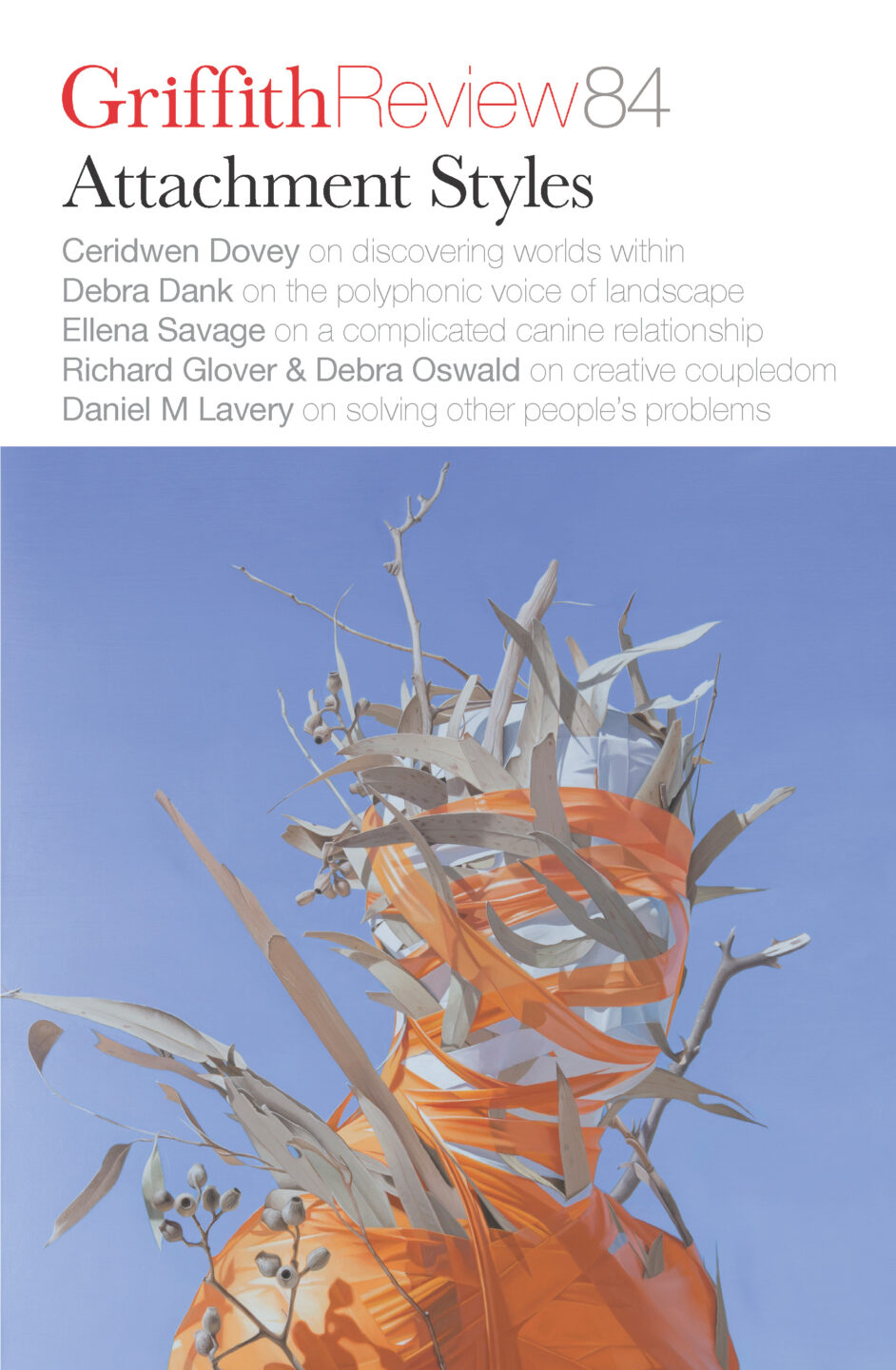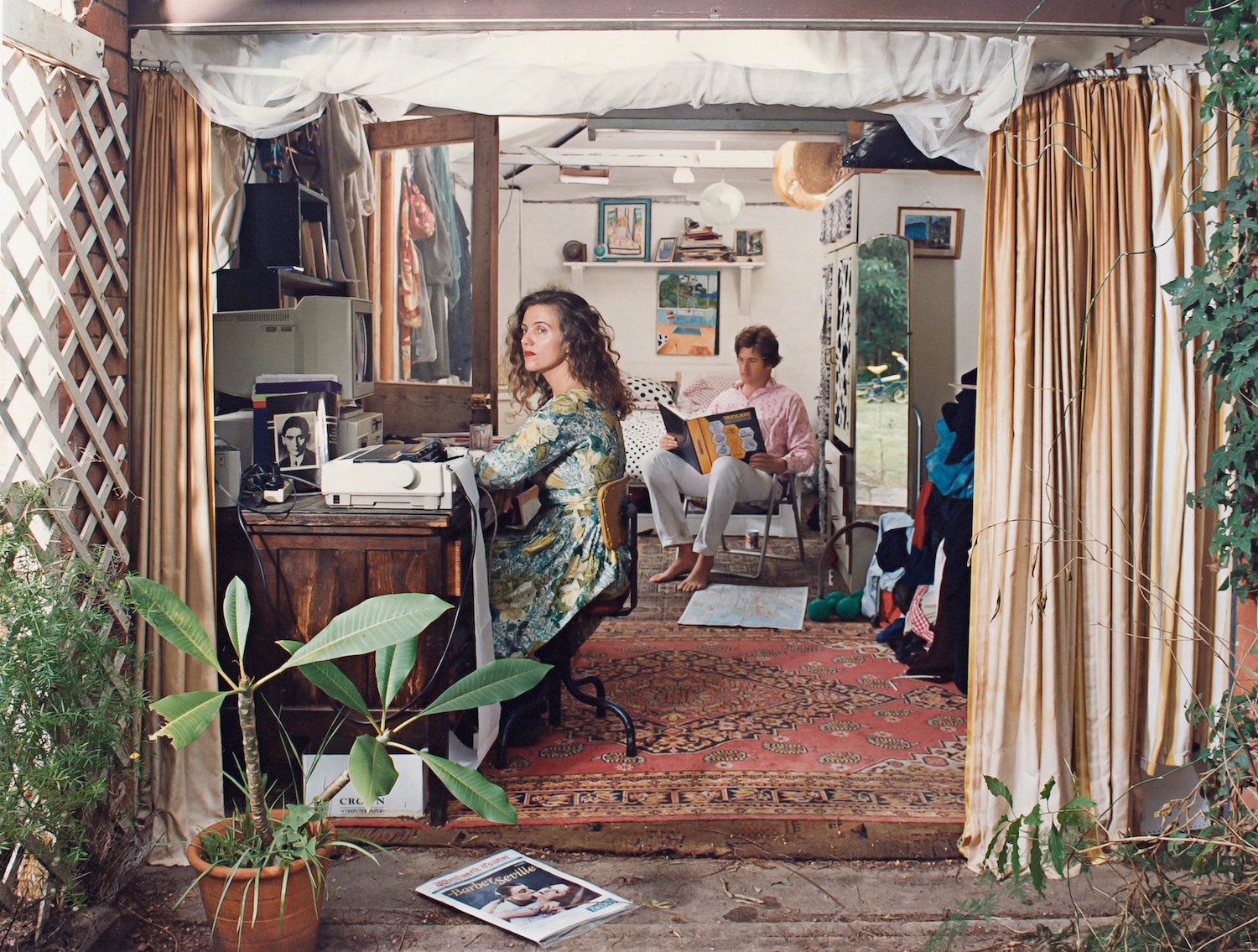Ask me anything
The agony and ecstasy of the advice columnist
Featured in

- Published 20240507
- ISBN: 978-1-922212-95-5
- Extent: 203pp
- Paperback, ePub, PDF, Kindle compatible

When Slate launched its ‘Dear Prudence’ advice column in 1997, the eponymous Prudence was the latest in a centuries-long line of pseudonymous and beloved agony aunts, from Dorothy Dix to Dear Abby, who dispensed guidance on manners, morals and more. But what about the person behind the persona? In 2016, US writer and editor Daniel M Lavery – co-founder of legendary humour website The Toast and the author of books including Texts from Jane Eyre – took up the helm as Prudence; he was the fourth writer to assume the mantle since the column began. For the next six years, while navigating seismic changes in his own life, Lavery offered wise counsel and whip-smart jokes to thousands of vexed letter writers. In this conversation, which has been lightly edited and condensed for clarity, he talks to Griffith Review Editor Carody Culver about the pleasures and pitfalls of other people’s problems.
CARODY CULVER: In your book Dear Prudence: Liberating Lessons from Slate.com’s Beloved Advice Column, you note that you’ve had an interest in advice columns since you were a teenager. What appealed to you about them when you were young?
DANIEL M LAVERY: I think especially when you’re young, you have such an interest in how other people live because you have a limited set of experiences. Usually you only know what your family does, and there’s that increasing awareness of complexity as you grow older, when you maybe start to spend afternoons or nights at a friend’s house and you realise other people live their lives in slightly different ways – and that’s fascinating.
When I was growing up, the newspaper was the easiest, quickest way, outside of going to school or visiting friends, to get insight into what other people think is reasonable behaviour. I also really liked that combination of, you know, what are common problems that people have, and then…if it’s in a newspaper, even though it’s anonymous, what are problems people have that they’re willing to admit to in public? I think there are some questions that, even with anonymity being a given, people would be less likely to write to an advice columnist for. So just all sorts of different human-interest moments: there’s drama, there’s intrigue, there’s disagreement, there’s shifting consensus, there’s etiquette, there’s politeness.
CC: I’ve read a few articles over the last couple of years proclaiming that advice columns are having a moment right now. Do you agree that we’re living in an age of peak advice?
DML: I don’t know that I’d be ready to claim it’s the peak just because I don’t know what might change in the future, but I think certainly since roughly 2010–12, a few years after the rise of early blogs, a lot of people were running independent online advice columns. And that slowly built up to a few big names coming onto the scene: Dear Sugar, Ask Polly and I think a handful of others that became more widely read in the 2010s. [Now] there seem to be both more of them than there would have been fifteen or twenty years ago, and also more [that are] widely read.
I think this has more to do with technology catching up to the level of interest. There have been previous peak-advice moments: probably the ’50s and ’60s, which had [high] newspaper [circulation]. Before that, in the ’20s and ’30s, there would have been even higher newspaper circulation…before some of the papers consolidated or laid off workers. So probably every generation or two there’s a new mode of reading or engaging with the public that enables a lot of advice columns, and in those times advice columns tend to thrive because people are curious about good behaviour and they want to make sure that their idea of what’s reasonable [aligns] with most others’, or for the pleasure of disapproving of a stranger. I think that’s a nice outlet too, because like many people, I struggle with my compassionate and judgemental impulses. You don’t want to be so compassionate that you’re unwilling to offer a judgement, and you don’t want to be so judgemental that you can’t get along with other people. And one of the things I think is really nice about judging a stranger is that it’s not the same as going up to an acquaintance or a co-worker and speaking your all. So it’s a little bit of a pressure-release valve for ‘I kind of want to be a busybody but I know that’s not something that I should be indulging in my daily life, so I’ll just read somebody else’s problem, quietly sneer or judge them, but then let it out into the day and go about my business’.
CC: I’m also interested in how, because of social media, everyone can get involved in a way that wasn’t possible ten or twenty years ago. For example, Slate will post some of their advice-column letters on Instagram, where they’ll attract hundreds of comments from readers. I always love comparing those comments with the columnist’s advice. Maybe that’s another factor – all of us can offer our two cents now when we see a problem that really piques our interest. I discovered recently that advice columns began as more general-interest, general-knowledge columns – they would answer questions about science or history, things like ‘Why can an owl see better by night than by day?’ Do you have any thoughts or theories about why they evolved to cover much more personal subjects?
DML: Certainly – I’m by no means an expert on the history of advice columns, but my general sense is that you could tag them pretty well to the rise of newspapers. So the seventeenth century is maybe as far back as you could go. As circulation goes up over the centuries, as well as the availability of print goods, you no longer have to turn to just one source, like your almanac, [for] your general information, your housekeeping, your etiquette, your social problems. If you think about the rise of etiquette manuals and [etiquette writers such as] Emily Post, and the shift to urban centres and waves of immigration in the late nineteenth and early twentieth centuries, more populations [were] brought into close contact with one another, [leading to] new questions and wanting to share space in the city. This urban shift [also meant that] most middle-class homes [went from] employing multiple servants to almost nobody having servants. That changes what you can expect of people: how do you respectfully address them, what needs of theirs do you have to pay attention to and vice versa? So that would be my guess: more questions come up, things get both less stratified and more fluid but are still equally important, so people have to pick up information on the fly. And there’s also just a different sense of what is public and what is private, so things that you wouldn’t necessarily have been willing to write about or ask about in public a hundred years ago are now appropriate to discuss.
CC: I was wondering about that and the evolution of subjects that people felt comfortable discussing, even with close friends and family.
DML: There’s a fun old movie from 1932 called Blessed Event – there was a spate of movies in the early ’30s to do with advice columnists. Lee Tracy is in it; he’s fantastic. He plays a guy called Alvin Roberts – he’s supposed to be a typical Walter Winchell [a famous American gossip columnist] type. The movie’s called Blessed Event because it’s a euphemism for pregnancy. The type of question that I would get fairly often [as Prudence] would be, ‘One of my acquaintances or co-workers or relatives recently asked me if I was pregnant and I’m not and I’m hurt and offended.’ And that’s not the kind of question you see in advice columns from the ’30s, ’40s and ’50s in part because there were more euphemisms for pregnancy generally. There were more rules about when it was or wasn’t appropriate to depict or describe pregnancy. Eventually that shifted – it’s sort of an unforeseen outcome of people saying, ‘This is a natural, physical process, everyone gets born and we should be able to talk about pregnancy.’ In fact, it created the possibility for there to be new violations of etiquette around pregnancy conversation and discourse for another generation down the road, and I think that’s always something that accompanies new freedoms in conversation: it makes room for new problems. The fact that we no longer say ‘a blessed event’ or ‘the stork is coming’ does mean that there are going to be people who think, ‘Great, we’re talking about pregnancy. If someone looks pregnant, I’m just going to ask them if they are.’ In the comments sections of the columns when this comes up, you’ll often see people say, ‘Don’t ask anyone if they’re pregnant unless they’re crowning in front of you, and possibly not even then.’ I think it’s a way of trying to delineate what’s a new rule. But that’s what’s fun about etiquette and social niceties – you can never so perfectly construct language or rules or procedures that it’s impossible to be rude. There’s just always going to be a new way to be rude or thoughtless or careless or insensitive, and that’s why I think it’s a really interesting and exciting and dynamic genre, because there’s always going to be something you couldn’t have anticipated.
CC: You experienced two significant shifts in your own life during your time as Prudence – you underwent a gender transition, and you became estranged from your family. Do you think these events changed the way you responded to people’s problems?
DML: Yeah, and some of this was reflected in the kind of questions I got as a result of [those two shifts] – I heard more often from people who had done similar things because when they shared experiences [with me] there was more curiosity and affinity than there might have been otherwise. So I certainly saw a shift in the types of people who were turning to me for advice, and there were times when, I think as a result of what I was experiencing, I struggled more to be patient. I struggled with letting go of black-and-white thinking. I struggled with trying to remember that everything I was reacting to wasn’t my own situation. So sometimes I think that made it more difficult and I probably became more judgemental, and other times I think I was able to correct for that and be a little more open-minded. I really tried to be careful of not cheaply suggesting estrangement. I didn’t want to get too invested either way – I think if you become estranged from relatives sometimes that’s necessary, and sometimes it’s painful and debilitating, and certainly I think it’s possible to expect unreasonable things from others in ways that we don’t expect [them] from ourselves. But I did want to try to be careful, to say, ‘If you don’t want to become estranged from your relatives, I’m not going to say that you must.’
CC: You also point out that the role of advice columnist isn’t one you can train for, and that sometimes this made you a really good advice columnist – I’d love to know more about your thoughts on this. In your time as Prudence, and now as the host of [Slate’s advice podcast] Big Mood Little Mood, do you find that lack of formal training freeing?
DML: It’s understood that advice columns are partly entertainment and partly sincere attempts to help. And everybody knows the formula, everybody knows the advice columnist does not keep writing back to the same person week after week after week. You get one question, and maybe a few weeks or a month later you write again with an update. There’s no ongoing surveillance or follow-ups…and there’s no way of confirming whether or not [a letter writer] took the advice. That was really helpful – it offered maximum creative freedom and minimum obligation and responsibility. You don’t ever want to go so off the rails that you encourage somebody to blow their life up thoughtlessly. It was always helpful to remind myself, ‘The most I can do is offer someone a useful suggestion that they will consider. They still have to make their own decisions based on how they want to live their lives.’ If you take yourself too seriously in that position, you feel like, my God, I’m responsible for the wellbeing of all of these strangers, what if I mess up?
CC: We have an increased vocabulary around relationships and mental health now – many of us have grown pretty comfortable using terms such as ‘narcissism’ or ‘boundaries’ or ‘gaslighting’ in regular conversation. In your time as Prudence, did you notice a growing tendency for letter writers to categorise their own problems with this kind of language?
DML: That’s probably the case, but I wouldn’t be able to swear to it. I would occasionally notice certain terms becoming more common, but not hugely. I do think that at a certain point I sort of took my own swing against [this tendency] – there are lots of popular concepts about personality or temperament or types that can run the gamut from generally harmless to moderately annoying to kind of harmful. My own personal bugbear happens to be love languages – I don’t like it. It’s no worse than astrology in some ways; it’s no worse than the Enneagram in some ways; not a lot better than them either, but…I don’t find those terms super useful. I sort of let it be known [in my time as Prudence] that they’re not my thing, but…the basic underlying impulse is totally understandable and appropriate. And as always, if you can [use those terms] with a light touch, tongue in cheek, great; if you take it deadly seriously, it’s the difference between, like, someone who has a sort of fun and playful relationship with astrology versus somebody who keeps insisting that you tell them the exact minute you were born because they need to read your entire life for you.
And in fairness to ‘gaslight’, it doesn’t come from therapy, it comes from the 1944 movie [of the same name]. And before that it was the play by Patrick Hamilton – we know exactly where it comes from. I do think it’s important to be aware, to the best of your ability, of the difference between terms that have come from therapeutic or psychoanalytic study versus ideas that have come in through pop psychology. I think there’s probably a useful distinction to be made there – again, a little bit like astrology, popular psychology can be fun and useful and more interesting if you go in with a real light touch.
CC: Something else that struck me when I was reading the book was the elastic definition of the word ‘problem’ – some letter writers faced incredibly painful and difficult scenarios, such as family members who refused to accept their sexuality. And then you’ve got others like the person who was helping a friend unload her dishwasher, accidentally caused her to drop an armful of plates and then felt affronted by the idea of having to apologise to her. I wondered how you balanced your responses to those kind of wildly different scenarios.
DML: One of the nice things about the smaller scale problems is that they give you more room to manoeuvre, because when it comes to the really big things, at least in the context of an advice column, there are only so many things to do. If it’s really serious there aren’t a lot of options, but something like [the dishwasher scenario] – you could have a thousand opinions on that. There’s no end to the speculation. [Whereas with problems like] ‘I’m in this horrible marriage, I’ve tried X, Y and Z for five years and I’m just miserable,’ most people who aren’t contrary would say, ‘That sounds really hard, probably time to think about a divorce, you should consult a lawyer and tell your friends so you can get emotional support.’
CC: With all the letters you received, you could only work with the information you were given, and of course there are always going to be gaps. How did you address the fact that you were just getting one person’s side of the story?
DML: My general goal was that unless there was something in a letter that led me to believe the writer was really missing something or focusing on the wrong thing, I’d do my best to take them at their word. I would try to leave some room for [the idea that] we can’t always see what other people see because we can only look at the world from a single perspective. I think a very well-intentioned person who is doing their best to do right by others will sometimes miss real wrong turns that they’ve made just by virtue of only having two eyes. In the cases where it felt like somebody was really leaving something out or had really missed something – in those cases, and I can think of a handful, it was pretty clear. So I would just say, ‘I feel pretty confident that this is not your problem, that’s your problem, and I think you need to totally reassess how you see the situation.’ It didn’t happen terribly often because it’s rare that somebody is both that confident they’ve assessed the situation accurately, but also unwittingly including information that compromises their version of events. There would be other times when it would seem important to say, ‘I think it’s very possible that everything you described happened just as you said it did, but I also think you missed multiple opportunities to have a conversation with the other person about this before things reached a sort of emotional boiling point.’
You’re always trying to find balance between the pleasure of telling someone off versus the meaningful work of trying to help, which is something that letter writers struggled with and that I as the advice columnist struggled with. We had that in common. I think all break-ups or estrangements or ruptures kind of come at the point where the two of you cannot agree on the narrative of your relationship any longer, and it’s always difficult after the fact to try to figure out, how much do I trust my own version of events? How much weight do I want to give to their version of events? What do I know about their version of events, because it may not be very much? It’s helpful not to make assumptions; it’s helpful not to try to round things up just because they feel close to the truth. So even if the best outcome that I could guide someone towards would simply be ‘I want you to have a better estrangement or a better break-up’, I think that’s worth doing too, because it’s nice to minimise rancour or bitterness even if a relationship doesn’t last forever.
CC: You write in the introduction to the book about assuming the role of Prudence and taking comfort in the fact that it’s a constructed persona. Was it tricky to maintain that balance between the Dear Prudence everyone has ‘known’ since the column began and you, Daniel, the real person at the helm?
DML: It definitely got easier over time…it was a little bit bumpy in the beginning. I mean, it was fun bumpy – I didn’t feel like Evel Knievel or anything, but I definitely vacillated in those first few weeks. I know I made a lot of jokes and then [wondered] if that was always going to be the right mode, so [looked for] different ways to rein that in.
Usually, people who want to be or have chosen to be advice columnists are not people who struggle with confidence in their decisions – you tend to be opinionated, and that’s usually why someone wants you for the job, which obviously serves you well but can also hold you back. And then there’s the struggle of: what do I miss, what do I not see, how do I change my mind if I get a lot of feedback that I think is reasonable? How do I do that without total ego death? How do I not take this all too personally? How do I not get too caught up in the idea of having to be right all the time? I think a lot of that I learnt on the job, but it was fun and pleasurable to learn, and it’s something that now informs a lot of my other writing in ways that I really value.
Photo credit: terimakasih0 from Pixabay
Share article
About the author

Daniel M Lavery
Daniel M Lavery is a co-founder of The Toast and the author of Texts From Jane Eyre: And Other Conversations with Your Favourite Literary...
More from this edition

Psychobabble
Non-fiction ONCE, ON A first date, a man asked me if I knew about attachment styles. He caught himself before he finished the sentence and...

The comfort of objects
In Conversation Anne Zahalka has been making viewers look twice for nearly four decades. One of Australia’s most respected photo-media artists, her practice explores shifting notions...

Origin stories
Non-fictionI CAN MAP your life by what was lost. History (personal and other). Culture. Language. Identity. Home, and all the references to you that it could have held. The very idea of home. The streets you would have walked down, streets that know the history of your family, of those who came before you. The chance to be the version of yourself who grew up with your biological family. The stories that should have been your birthright.